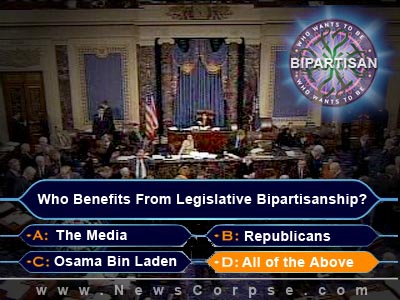 For the past week, Congress has been embroiled in a debate over solutions to the nation’s current economic crisis. Hundreds of proposals for the Stimulus Bill have been considered, from tax cuts to infrastructure spending to mortgage relief to banking reform. But to hear the media tell it, the most pressing issue in Washington was whether the administration could achieve the fabled goal of bipartisanship.
For the past week, Congress has been embroiled in a debate over solutions to the nation’s current economic crisis. Hundreds of proposals for the Stimulus Bill have been considered, from tax cuts to infrastructure spending to mortgage relief to banking reform. But to hear the media tell it, the most pressing issue in Washington was whether the administration could achieve the fabled goal of bipartisanship.
But who really wants to be bipartisan?
The short answer to that question is “the losers.” The minority in Congress wants desperately to wield some measure of influence over legislation and policy. The problem for them is that they didn’t earn it at the ballot box. The American people, in overwhelming numbers, elected Democrats to Congress and the White House. They could have voted for Republicans but, after listening to both sides, expressed a distinct preference for Democratic candidates and solutions. Consequently, the pursuit of bipartisanship by Democrats is an outright betrayal of the will of the people.
The idiocy of elevating bipartisanship as a goal unto itself is a fabrication conceived by Republicans and the right-wing dominated press. It is a battlefield that the minority party prefers because they can control it. All they have to do is enforce party discipline, instruct their members to vote against the majority, and then claim to be the victims of a partisan process that they themselves contrived.
The media goes along with this deceit for reasons of their own. For one, it produces the sort of drama they relish for boosting ratings. For another, they use it to defend themselves from false right-wing criticisms that they are a liberal leaning institution (though they never seem bothered by liberals who complain that they lean to the right). So in pursuit of controversy, reporters re-frame the debate from the substance of the bill to a manufactured desire for unity – a confounding unity of programs of the popularly elected majority with those of the recently rejected minority.
Throughout this process, it should be noted, the definition of bipartisanship has congealed into a rather useless, and perhaps harmful, mush. To be productively bipartisan would be to incorporate ideas from both sides. But what has evolved is more of a stew wherein everything is blended together until it is unrecognizable and ineffective. It’s as if a disagreement over whether to order some Japanese take-out or a bucket of chicken resulted in picking up some Kentucky Fried Sushi. Mmmm. That’s what Congress is doing and it’s going to make a lot of people sick.
Compromise, in and of itself, is not necessarily a desirable goal. Especially if one side is intent only on sabotaging the other. After all of the concessions that Democrats made on the Stimulus Bill, in the hopes of appealing to Republicans, the Republicans still stiffed Democrats, providing only three votes. Nonetheless, Republicans succeeded in diluting the bill, increasing the odds that it will fail – a result they favor as it would help them politically, albeit at the expense of millions of suffering citizens. This is both unconscionably uncaring and an affront to democracy. Americans are entitled to the government they elected, not one that is held hostage by parliamentary shenanigans.
To be sure, Barack Obama and his administration contributed to the frenzied discussion of bipartisanship. It has been a priority for them that goes back to the campaign. But they seem to have learned their lesson, as Chief of Staff Rahm Emanuel admitted that the White House placed an over-emphasis on process and may have neglected reinforcing the message. Message discipline is more important than ever in the modern media environment that will pervert and distort events and intentions if left to their own devices.
The self-serving maneuvering of Republicans, however, is almost never reported by the media. So when a bill is passed with a massive majority (House: 246-183; Senate: 60-38), the media still describes it as a “Bipartisan Bust,” rather than an historic legislative victory. Every headline that says that the bill was passed along party lines fails to to make clear that one party just happens to far outnumber the other due to the voters preference.
The negative framing of these stories is purposefully at odds with the public who continue to support the Democratic program. Americans deserve more from the press. We deserve reporting that addresses issues substantively, rather than trivialized by shallow, political, pseudo-analysis. It is long past time for the press to honestly portray bipartisanship as nothing more than a partisan tactic to delay and obstruct the will of the people.


Since the days of Newt Gingrich giving speeches to a CNN camera, and an empty room, the republicans have elevated politics over government, despite the fact that their very purpose is to govern. This was most apparent to me following 9-11 when Congress, and both parties within the institution, willfully ceded their governmental duties, primarily because of crisis but partially, and most disturbingly for the sake of politics (the “bipartisan” meme then being “patriotism”). The manipulation of facts and image that has become politics in lieu of responsible government reached its nadir or zenith, depending on how you look at it, with Sarah Palin’s nomination and subsequent campaign for vice-President. It is apparent, as you point out, that politics is the primary objective of the Republican party in Congress at the expense of critical government in a time of crisis. This is why the Republican party is dying in terms of ideas and majority public opinion.